The Genron NPO (Representative Yasushi Kudo) and China Daily has released the result of the ninth Japan-China joint public opinion poll.
The perceptions and feelings of the Japanese and Chinese public towards each other have worsened across-the-board in the past one year. Worsening of mood between both societies can be attributed to tensions between the two countries over the Senkaku Islands.
The issue had a significant influence on results in almost all question areas, including mutual impressions, perceptions of bilateral relations, and the future of Japan-China ties. Lack of personal interaction between the two societies, dependence on domestic media for information on each other's countries, as well as structural factors can be seen to lie behind this trend.
Analysis Report on the Comparative Data Aug 12, 2013
Japan:Public Opinion Research Institute Corporation
China:China Daily, Horizon Research Consultancy Group
Copyright(c) 2013 The Genron NPO and China Daily All Rights Reserved.
2. Basic Understanding between Japan and China
3. Awareness about the Present and Future of Japan-China Relations
4. Japan-China Relations, Japan-U.S. Relations and China-U.S. Relations
5. Private-Sector Interchanges
6. Nationalism
7. Historical Issues between Japan and China
8. Japan-China Peace and Friendship Treaty
9. Territorial Issues
10. Military Threat and Security in East Asia
11. The Future of Japan, China and the World
12. Economical Relations between Japan and China
13. Evaluation of Media Coverage and Popular Opinion on the Internet
14.The Backdrop behind the Countries' Mutual Understanding of One Another
1. Impressions of One Another's Countries
■ Impressions of Each Other's Country among the Japanese and Chinese Peoples
In the latest survey, the impressions of each other's country significantly worsened among the Japanese and Chinese peoples compared to last year. Among the Japanese polled, 90.1 percent replied they have unfavorable impressions about China. A comparable figure for the Chinese polled came to 92.8 percent. Both findings were the worst results in the past nine surveys.
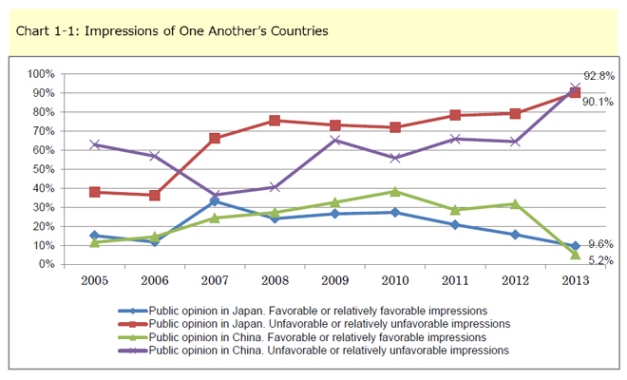
■ Reasons Behind Impressions Between the Two Countries
The biggest reason for "unfavorable impressions" of China among the Japanese polled was the continuing confrontation over the Senkaku Islands, a group of Japanese-controlled islets in the East China Sea. The dispute was mentioned as a reason for unfavorable impressions by over half of the Japanese polled, increasing from last year.
In addition, nearly half of the Japanese mentioned such reasons as "China criticizes Japan mainly over historical issues" and "China takes selfish actions for securing energy resources and food.'' Among the Chinese polled, the largest percentage, 77.6 percent, mentioned that "Japan has caused a territorial dispute over the Diaoyu Islands (Senkaku Islands), taking a hard stance toward China." Meanwhile, 63.8 percent of the Chinese polled cited what they see as Japan's lack of a proper apology and remorse about its invasion of China. This figure far surpassed last year's finding of 39.9 percent.
The largest percentage of 43.8 percent among the Japanese polled mentioned their interest in China's old culture and history as a reason for their favorable impression of China. Of the Chinese polled, 58.2 percent referred to Japan's advanced technology as a reason for their favorable impression of Japan. Among other reasons for favorable impressions about Japan, nearly half of the Chinese polled replied that Japanese people are diligent, and work hard and actively, or cited Japanese products' excellent quality and Japan's remarkable economic development after the end of the war.
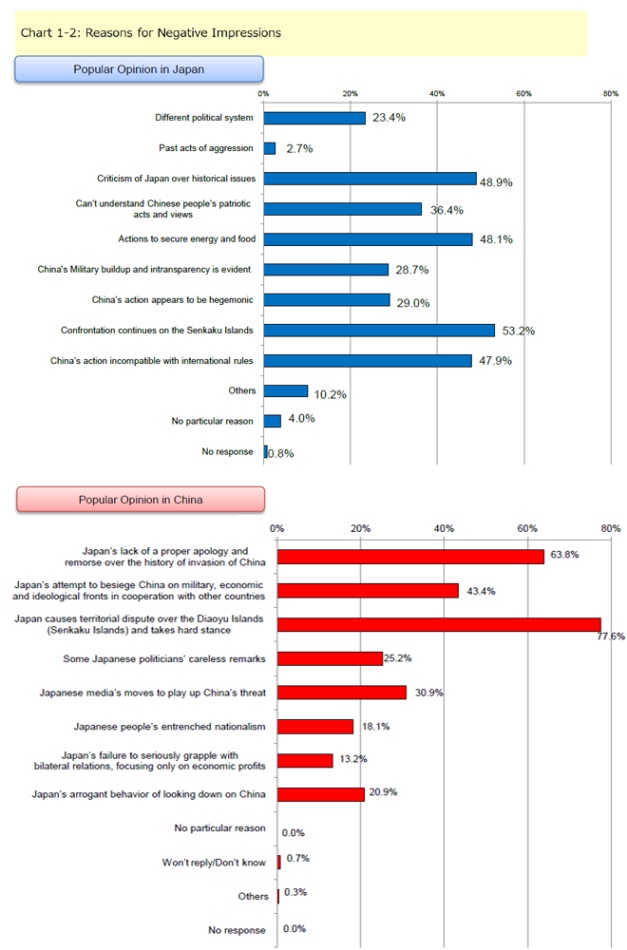
2. Basic Understanding of One Another's Countries
■Did Mutual Understanding Between the Two Countries' Peoples Improve?
Chinese food remained as the most frequently cited item in a question for the Japanese polled about what is recalled when they hear the word ''China.'' But the percentage of those who mentioned the problems of the Senkaku Islands increased from last year. Air pollution, a newly included answer, was also cited by a certain ratio of respondents. When asked about their knowledge concerning Chinese political leaders, nearly half of the Japanese polled replied they know about Chinese President Xi Jinping. However, the name of Chinese Premier Li Keqiang was known only by less than 10 percent of those polled.
In a question for the Chinese about what is recalled when they hear ''Japan,'' the ranking of Japanese home electronics declined to third place from first place last year. The percentage of Chinese respondents who cited the Diaoyu Islands and the so-called Nanjing Massacre both surpassed 50 percent. In a question about Chinese people's awareness about historical affairs and incidents in Japan, more than 90 percent of the Chinese polled replied they know about the Manchurian Incident, the Marco Polo Bridge Incident and the Nanjing Massacre. Awareness about developments in Japan after the end of the war proved to be poor.
Only less than 20 percent of the Chinese were aware of the conclusion of the Japan-China Peace and Friendship Treaty 35 years ago. Asked about Japanese political leaders who are familiar to Chinese, the percentages of those who mentioned Prime Minister Shinzo Abe and Deputy Prime Minister Taro Aso increased substantially from last year.
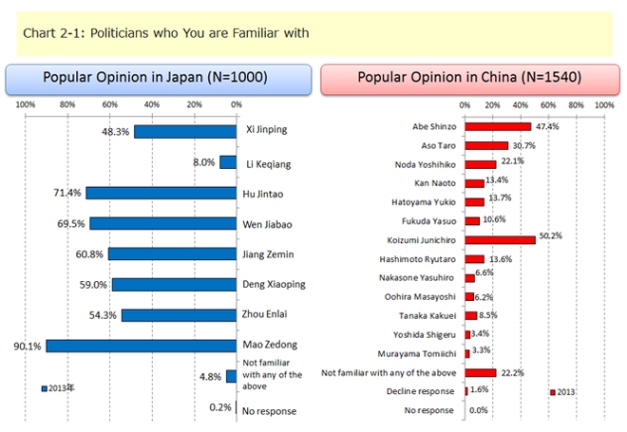
■ Awareness of "Social/Political Systems" of One Another's Countries
Nearly 70 percent of the Japanese polled viewed China as a socialist or communist country. This was followed by the answers by over 30 percent of the Japanese that China is a totalitarian state under a one-party dictatorship or a militarist power. On the Chinese respondents' side, the largest percentage of 48.9 percent viewed Japan as expansionism, showing a sharp increase from 35.1 percent a year before. Those who view Japan as a militarist power amounted to 41.9 percent, falling from 46.2 percent last year but staying above 40 percent. Only 6.9 percent of the Chinese polled viewed Japan as a pacifist country.
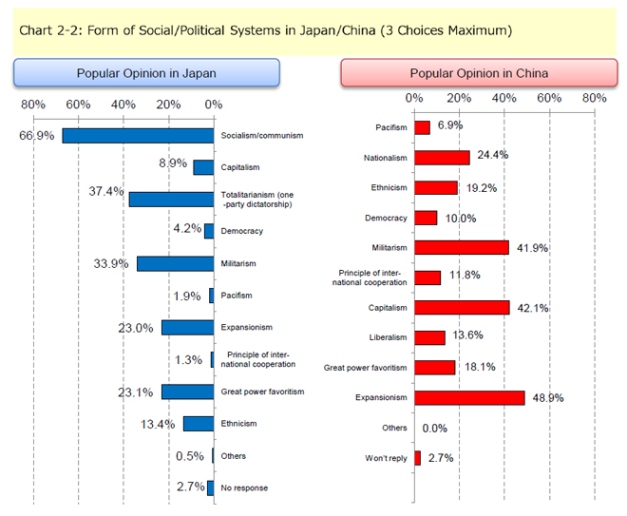
■ How the Respective Countries View One Another's National Character?
About half of the Japanese polled believe that Chinese are diligent but stubborn, selfish and non-cooperative so they cannot be trusted. Meanwhile, 70 percent of the Chinese polled think that Japanese are militant, selfish and they cannot be trusted. More than half of them view the Chinese as lazy, stubborn, and dishonest and non-cooperative. As the impressions of each other's country worsened among both countries' peoples, the mutual evaluations of their national character became worse by and large.
3. Awareness about the Present and Future of Japan-China Relations
■ How are Current and Future Japan-China Relations Viewed?
The latest survey showed 80 percent of the Japanese polled and 90 percent of the Chinese polled believe that Japan-China relations are "bad." Both figures were the worst results in the past nine surveys. The ratio of those foreseeing better relations between the two countries came to only about 10 percent both among the Japanese and Chinese polled. Conversely, the percentage of Japanese expecting even worse bilateral relations in the years ahead increased to 28.3 percent. A comparable percentage on the Chinese side also grew to 45.3 percent, indicating a spread of pessimistic views about the course of Japan-China relations on both sides.
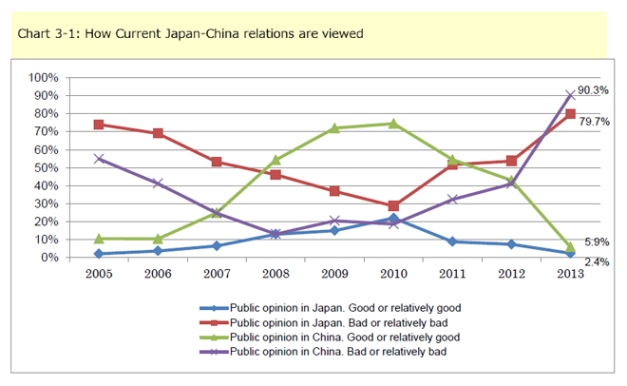
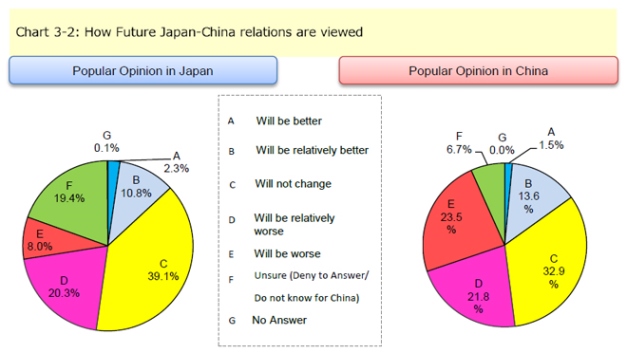
■ "Territorial Issue" Is the Biggest Source of Concern for Future Japan-China Relations
The biggest source of concern perceived by both countries' peoples is the "territorial issue."
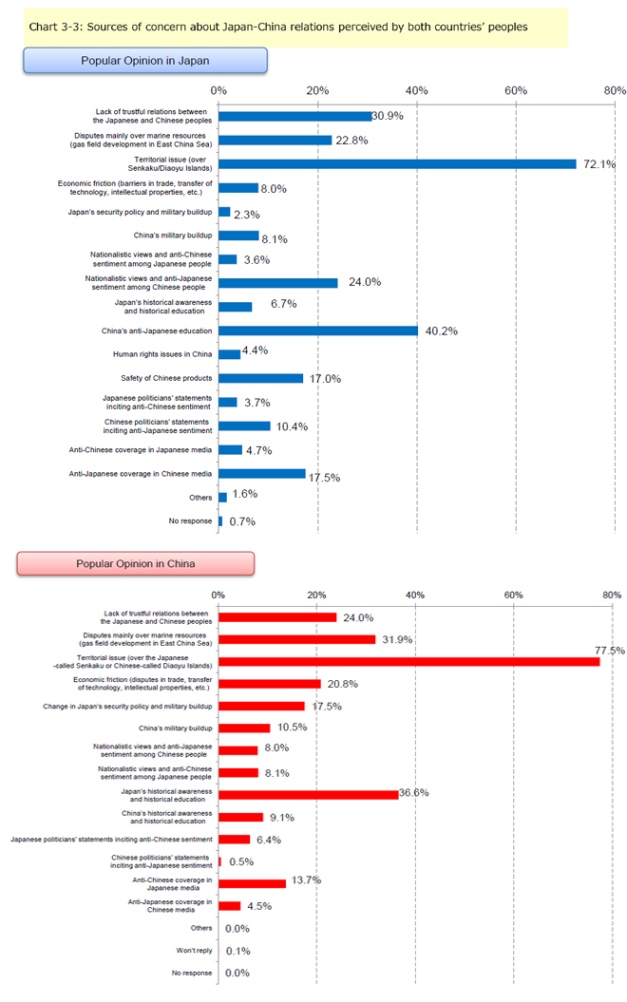
■ How the Importance of Japan-China Relations Is Viewed
The ratio of those who view Japan-China relations as "important" to each other's country surpassed 70 percent both among the Japanese and Chinese polled. Despite an increase in negative perceptions about Japan-China relations, the awareness about the importance of Japan-China relations remained strong among both countries' peoples. However, this awareness tends to decline, only slightly, on both sides.
As reasons for the importance of Japan-China relations, more than half of the Japanese and Chinese polled cited the fact that the two countries are neighbors. This was followed by the answers that the two countries are the world's No. 2 and No. 3 economic powers, and that their relations of economic interdependence are becoming stronger and mutually beneficial.
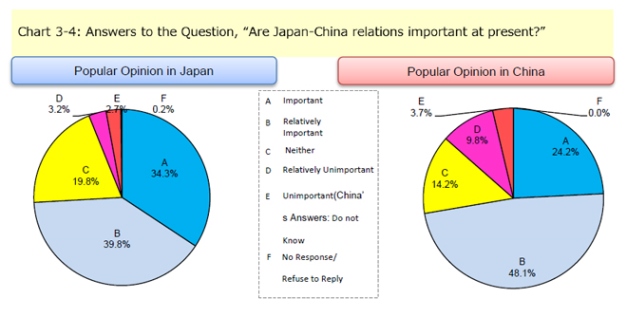
■ Closer Cooperative Relations Between Japan and China
The need for Japan and China to cooperate in grappling with challenges facing Asian countries was supported by many of the Japanese and Chinese polled. But 30 percent of the Chinese polled opposed these cooperative efforts. As specific fields where the two countries should cooperate with each other, over 80 percent of the Japanese polled cited environmental problems, such as air pollution. The largest percentage of 40 percent on the Chinese side mentioned peacekeeping activities in East China.
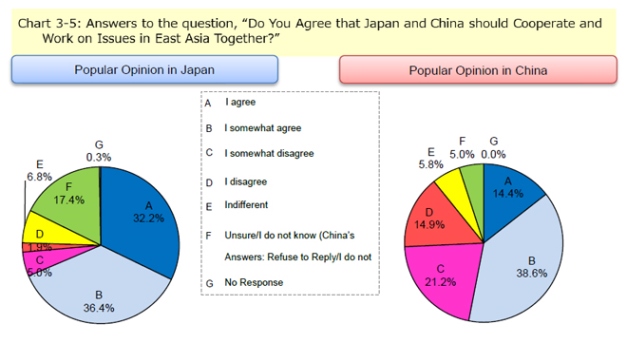
4. Japan-China Relations, Japan-U.S. Relations and China-U.S. Relations
■ Importance of, and Affinity for Relations Between Japan, China and the U.S.
More than half of the Japanese and Chinese polled view that relations between Japan and China are as important as relations between their respective countries, and the United States. But many of the polled replied relations with the United States are more important than relations with each other's country. Compared to last year's results, the tendency of regarding relations with the United States as more important became more conspicuous among both countries' peoples. In particular, the percentage of Japanese who view relations with the United States as more important grew by more than 10 points.
Regarding the affinity among Japan, China and the United States, more than half of the Japanese polled felt more affinity toward the United States. Only 5.8 percent of them felt so toward China. Among the Chinese polled, the answer "No affinity is felt toward either" was most frequently chosen. The second-largest percentage of 28.1 percent of the Chinese polled felt more affinity toward the United States. Only 3.0 percent felt more affinity toward Japan, half of last year's result.
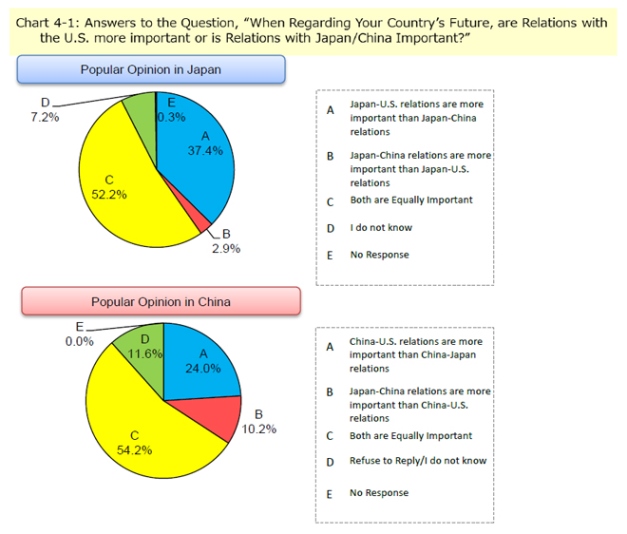
5. Private-Sector Interchanges
■Views about Visits to Each Other's Country
About 70 percent of those polled on both sides did not hope to visit each other's country. The figure was far higher than last year on both sides.
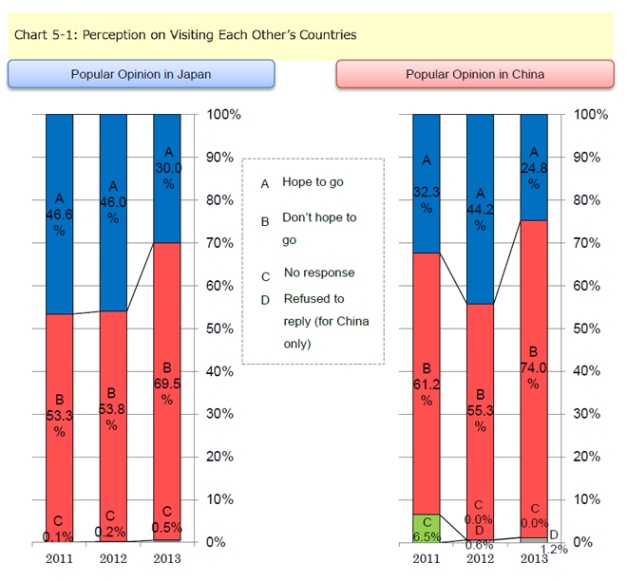
■ Views about Private-Sector Interchanges among Japanese and Chinese Peoples
About 60 percent of the Japanese and about 70 percent of the Chinese viewed private-sector interchanges as important, but these ratios declined from last year. Asked about why they see private-sector interchanges as important, many of the Japanese polled mentioned the need to promote mutual understanding while many Chinese respondents cited their belief that private-sector interchanges are a foundation for expanding common benefits.
6. Nationalism
■ Awareness about Own Country's Nationalist Trends
Asked about the course of nationalist trends in their respective countries, nearly 60 percent of the Chinese polled felt a stronger nationalist trend in their country. "Don't know" was cited by the largest percentage of 38.2 percent on the Japanese side, indicating that the Japanese are less aware about the course of nationalist trends in Japan.
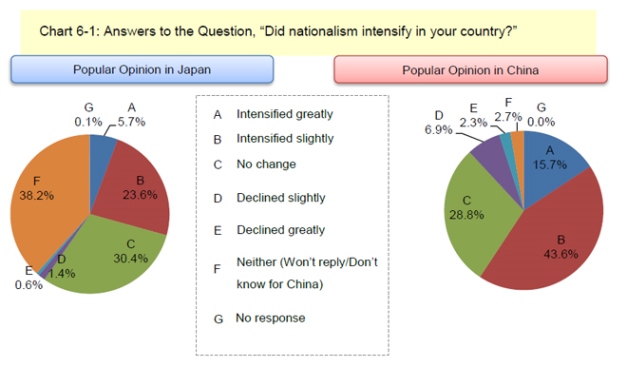
7. Historical Issues between Japan and China
■Awareness about Historical Issues among Japanese and Chinese Peoples
Fewer Japanese respondents expected historical issues to be resolved gradually as bilateral relations develop. Conversely, the ratio of respondents foreseeing difficulties in finding a solution increased, indicating more Japanese are becoming pessimistic about the course of efforts to solve the historical issues. The optimistic view that the historical issues will be resolved as the bilateral relations develop continued to occupy the largest percentage on the Chinese side since the start of the survey in 2005. But in the latest survey, many respondents mentioned that the bilateral relations will not develop unless the historical issues are resolved.
Asked specifically what must be resolved among the historical issues pending between the two countries, nearly 60 percent of the Japanese polled cited China's anti-Japanese education and critical expressions about Japan's past acts in Chinese school textbooks. The most frequently cited answer among the Chinese polled was Japan's need to express a proper apology and remorse over its invasion of China.
Another answer cited by more than half of the Chinese polled was Japan's need to respect the established historical theory regarding Japan's invasion of China. A certain ratio of respondents cited problems on their country's side, such as remarks by political leaders in their respective countries, as issues that must be solved, but the numbers of these respondents decreased.
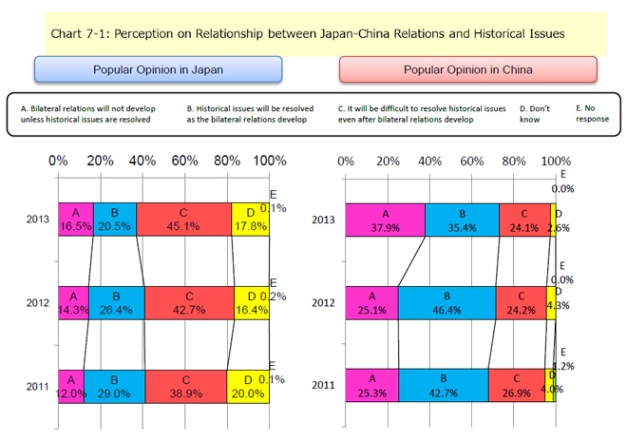
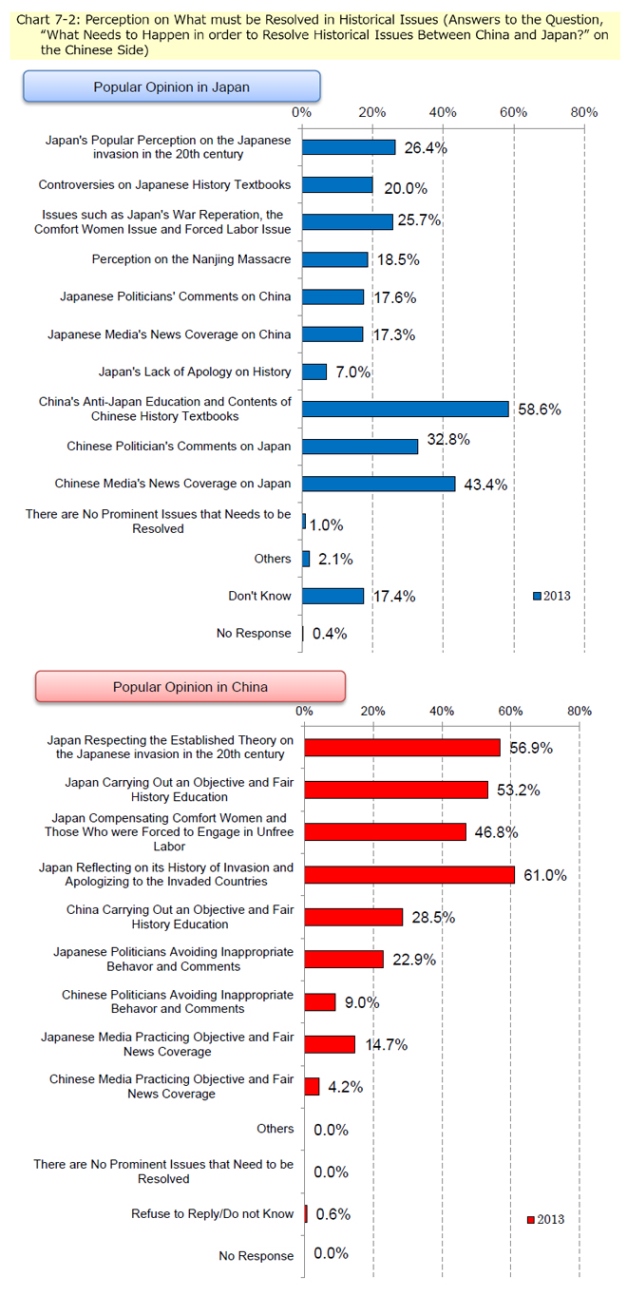
■Views about Japanese Prime Minister's Visit to Yasukuni Shrine
The largest percentage of about 50 percent among the Japanese polled viewed that there is no problem about a Japanese prime minister visiting Yasukuni Shrine, a war-related Shinto shrine in Tokyo. Including those who see no problem if a visit is made as a private citizen, more than 70 percent of the Japanese polled sounded tolerant toward such a visit.
The percentage of Chinese who believe a Japanese prime minister should not visit the shrine, whether in an official capacity or as a private citizen, increased sharply from last year's survey to 62.7 percent. The ratio of Chinese who replied that there is no problem if a visit is made as a private citizen fell substantially, indicating that the attitude of an increasing number of Chinese people is hardening toward a Japanese prime minister's visit to Yasukuni Shrine.
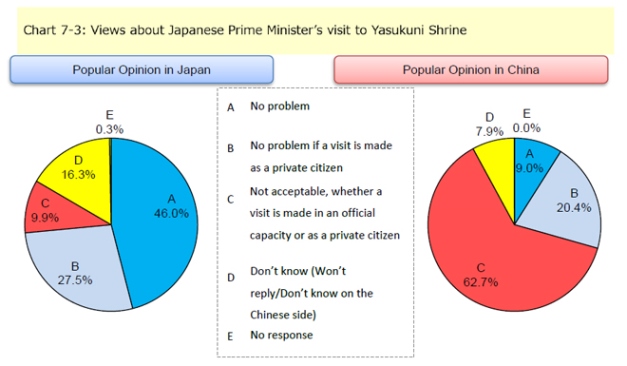
■Necessity for Leaders' Meetings between Japan and China
No official meeting has taken place between the two countries' leaders since Japan-China relations worsened due to their confrontation over the Senkaku Islands several years ago. When asked whether leaders' meetings need to be held, about 60 percent of the Japanese and Chinese polled replied in the affirmative. However, nearly 40 percent of Chinese respondents viewed such meetings as unnecessary.
8. Japan-China Peace and Friendship Treaty
■ The Japan-China Peace and Friendship Treaty and Its Modern-Day Significance
Over 60% of the Japanese say that they are "aware" of the Japan-China Peace and Friendship Treaty signed 35 years ago between Japan and China. However, only 40% of Chinese say they are "aware" of this Treaty, with 60% answering that they are "unaware." With regards to the Treaty's modern-day significance, the majority of Japanese attach the highest importance to the first article calling for the use of "peaceful means to settle all disputes," while the Chinese view the second article "opposing any attempts at hegemony" at the most important.
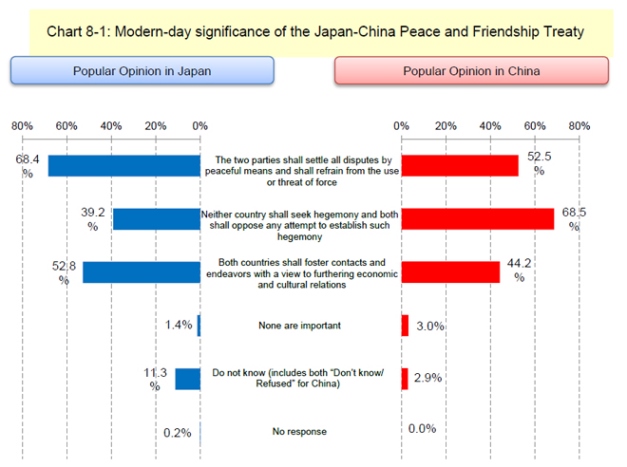
9. Territorial Issues
■ The Senkaku/Diaoyu Islands and the Territorial Dispute
The "existence of a territorial dispute between China and Japan" is acknowledged by 60% of the Japanese and 80% of the Chinese. Especially among the Chinese, there has been a sharp increase in people with such awareness over the past year.
With regards to solutions, approximately 50% of the Japanese say that "the two countries should promptly proceed towards negotiations with the view to resolve their issues through peaceful means", followed by 40% of respondents favoring "submission of the case to the International Court of Justice". Among Chinese respondents, responses that "in order to protect the territory, China must strengthen its effective control over its territories" and that "China must make Japan acknowledge the existence of territorial disputes by utilizing diplomatic means" accounted for the majority when the two responses were added up.
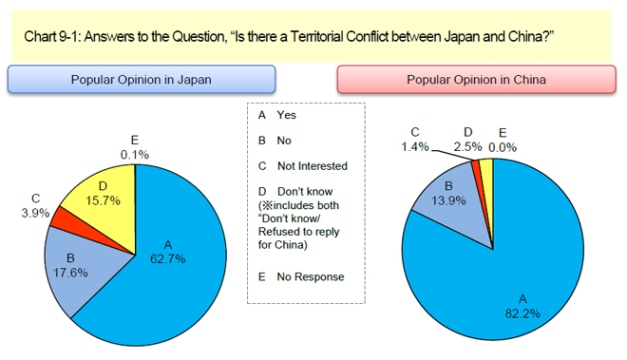
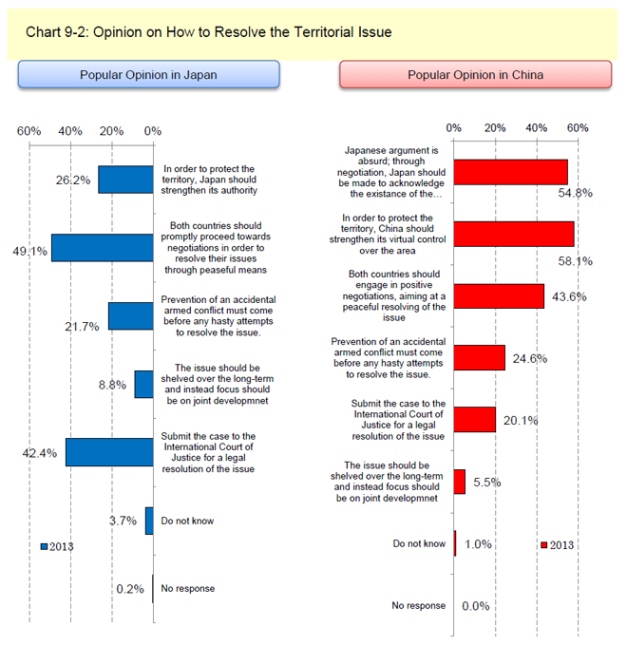
■Influence of the Conflict on Economy
Approximately 70% of the Japanese and 80% of the Chinese believe that the conflict between Japan and China over the Senkaku/Diaoyu Islands influences the economies of both countries. Specifically, 65.1% of those in Japan and 52.4% of those in China believe that the conflict has an adverse effect on both countries' economies.
10. Military Threat and Security in East Asia
■Possibility of Military Conflict between Japan and China
While the majority of the Japanese respondents believe that "there will be no military conflict between Japan and China," over half of those questioned in China think that military conflict will erupt at some point.
In connection to this issue, over half the Japanese think "there is a need to establish a permanent platform for discussion on security in East Asia," while about half of the Chinese think likewise. However, there are different views as to which countries should participate in these discussions. The most common response in Japan includes "Japan," "China" and "Korea," while in China, opinions are starting to center on China and the US.
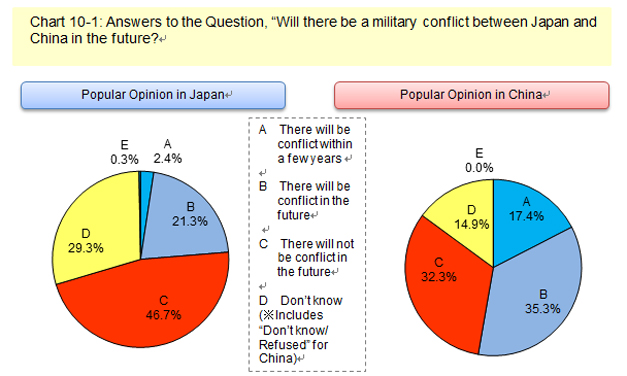
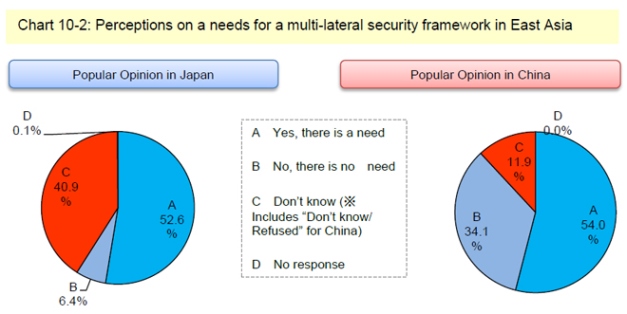
■ Understanding of Military Threats
While the Japanese, continue to see "North Korea" as their greatest military threat, there has been an increase in those who see "China" as a military threat, constituting over 60%. More than 60% of the reasons given for this include "the conflict between Japan and China over the Senkaku Islands and marine resources" and the fact that the Chinese "repeatedly infringe upon territorial waters of Japan."
The Chinese feel the "US" poses the greatest threat at 70%, followed by "Japan" at 50%. These percentages have increased since the previous year. The greatest reason for this is "the waning sense of remorse and apology for the war of aggression" at 69.9% followed by the reason that "the Japanese have occupied Diaoyu and the surrounding islands and do not acknowledge the territorial dispute" at 56.6% and the fact that "the Japanese National Defense Program Guideline considers China its potential enemy" at 47.7%.
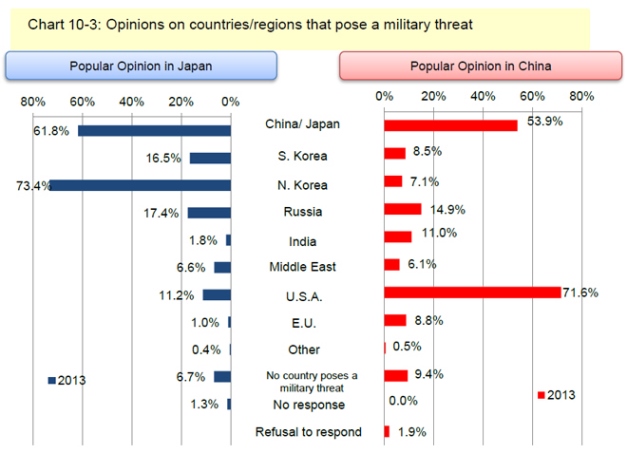
11. The Future of Japan, China and the World
■ Countries That Will Lead Future World Politics
Over half the Japanese believe that the "US" will lead future world politics. Those who selected "China" decreased slightly to 16.2%.
For China, the "US" surpassed "China" in last year's survey as the country that will lead future world politics, however, with a decline in those that chose the "US" this time, the US and China are almost evenly matched.
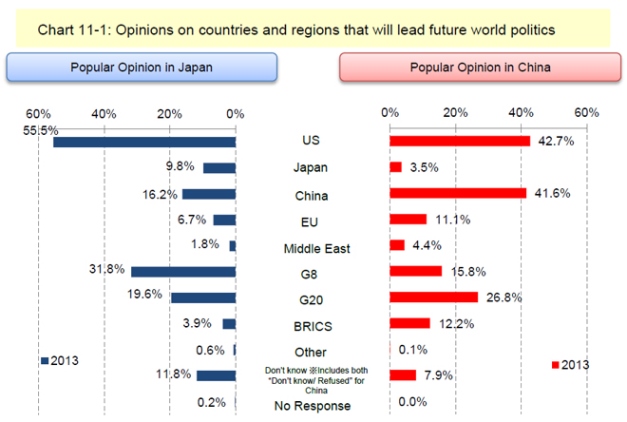
■ What Will Happen to Japan and China in 2030?
With regards to the Chinese economy in 2030, a 29.3% majority of the Japanese is of the opinion that "it will be difficult for the Chinese economy to continue in a smooth growth and its future is exceedingly uncertain." This is followed by the opinion that "the Chinese economy will continue to grow, but it will be difficult for China to match up to the US," showing the spread of a more cautious outlook on the potential growth of the Chinese economy.
On the Chinese side, with regards to the international influence of Japan, a 33.1% majority says that "the rank and influence of Japan's economic power will decline." However, the opinion that the rank and influence of the third greatest economic power will be maintained remains strong.
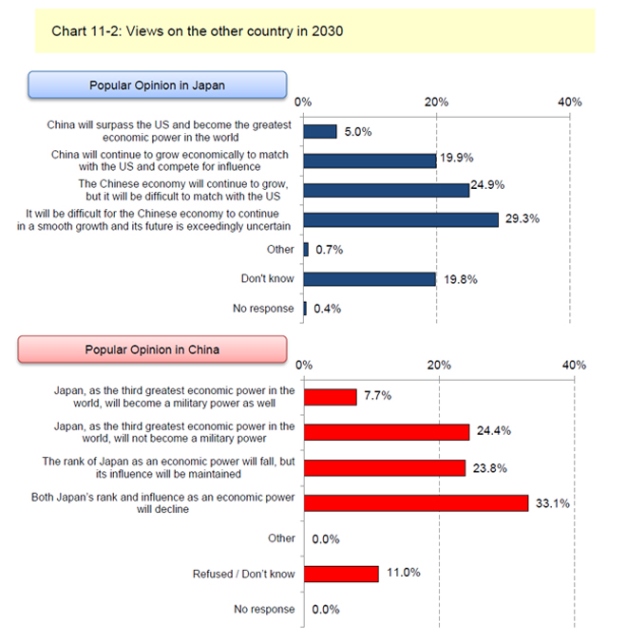
12. Economical Relations between Japan and China
■ On economic relations between the two countries
With regards to economic relations between Japan and China, the percentage of Japanese who feel that "a win-win relationship can be constructed" has halved since last year, with a 40% majority of Japanese stating that "it will be difficult to construct a win-win relationship." While 60% of the Chinese think that a "win-win relationship can be constructed," 30% are still of the view that "it will be difficult to construct a win-win relationship."
With regards to whether future Japan-China relations will veer towards "cold political relations but hot economical relations" or "cold political and cold economical relations," the majority of both the Japanese and Chinese believe that relations will head towards "cold political and cold economical relations."
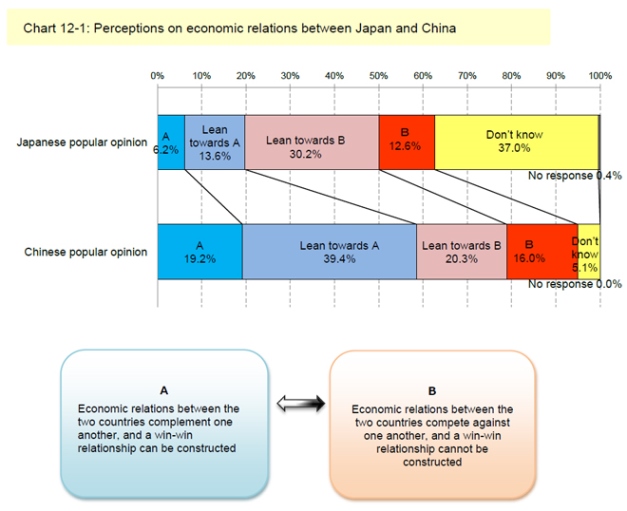
13. Evaluation of Media Coverage and Popular Opinion on the Internet
■Perception on freedom of speech and freedom of the press in the other country
Of the Japanese, 80% say that there is no freedom of speech or press in China, or that it is restricted. In response, 70% of the Chinese are of the view that "the Japanese press is, in actuality, restricted" or that "there is no freedom of speech or press in Japan."
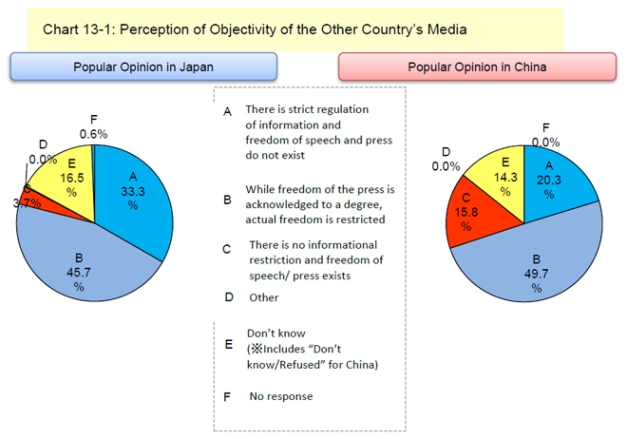
■ Objectivity of Domestic Media
Only over 20 percent of the Japanese view domestic media as conducting "objective and impartial coverage" on Japan-China relations. On the other hand, over 80 percent of the Chinese perceive domestic media as conducting "objective and impartial coverage" on Japan-China relations.
■ Popular Opinion on the Internet and the People's Will
Less than 10% of the Japanese say that popular opinion on the internet reflects the true opinion of the people. On the other hand, among the Chinese respondents, those who believe that popular opinion on the internet "reflects" or "does not reflect" true public sentiment are split at 40% each.
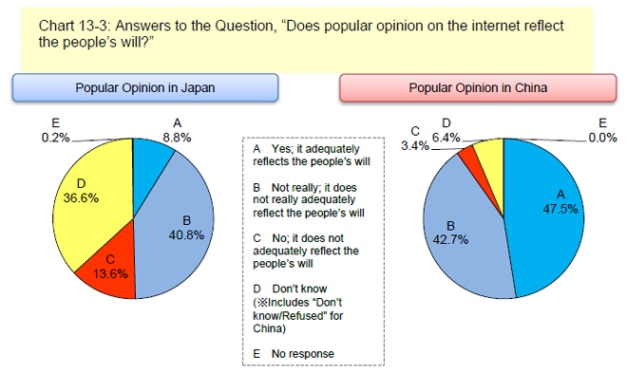
14. The Backdrop behind the Countries' Mutual Understanding of One Another
■ The Degree of Interaction Between the Chinese and Japanese People
No "tendency towards improvement" seen in direct interaction between the people of both countries for 9 years
Direct interaction between the citizens of both Japan and China has been exceedingly sparse for the past eight public opinion polls, and the surveys have revealed that understanding between the countries have depended almost wholly upon indirect information gained from domestic media. This tendency has basically remained unchanged in the ninth opinion poll conducted in 2013.
The Japanese understanding of China relies heavily on Japanese TV news broadcasts
Only 14.7% of the Japanese responded that they have "visited China." (This number was 16.5% last year) This situation has not changed since the surveys started in 2005. At the same time, a total of 20.3% (19.7% last year) of the Japanese responded that they have Chinese friends with whom they are either "close" or "have some conversation with." In other words, only around 20% of the Japanese have experience traveling to China or have had interactions with Chinese acquaintances. This degree of interaction has not changed in the past nine polls.
Of the Japanese, 95.0% cited the "Japanese news media" as their source of information on China and, of these, the largest rate was attributed to the "television" at 79.7%.
Direct interaction with the Japanese people is even scarcer for the Chinese, but their sources of information are more diverse than those of the Japanese. Apart from the news, the Chinese use TV shows, movies and publications to a relatively high degree and the use of the internet is overwhelmingly high among Chinese intellectuals.
In comparison, the degree of direct interaction with the Japanese is even scarcer for the Chinese. A mere 2.7% responded that they have had experience traveling to Japan (this number was 1.6% last year). At the same time, a total of only 3.3% (3.0% last year) responded that they have Japanese friends with whom they are either "close" or "have some conversation with," showing no large change over the past 9 years.
However, the difference between the Chinese and the Japanese lay in the proportion of information sources on Japan. Of the Chinese, while 89.1% replied that their source of information is the "Chinese news media," a high percentage also gave other responses such as "Chinese TV shows and movies" at 65.3% and "Chinese books (including textbooks)" at 36.3%, showing the diversity of information sources in China and a slightly different tendency from the Japanese dependence on domestic news media. Most of the Chinese formed their understandings and impressions of Japan not only through publications and news media but through Chinese TV shows and movies as well.
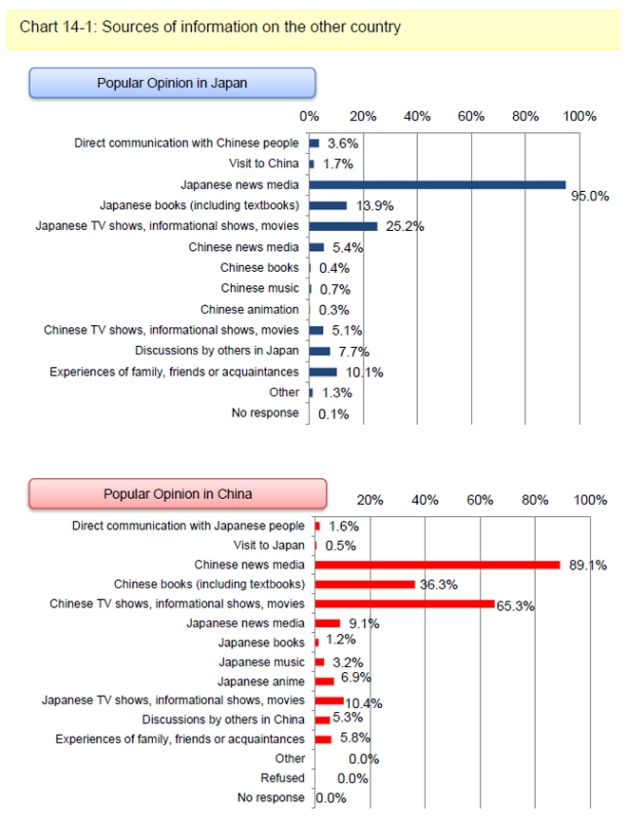
Please send any questions or comments to this survey to the following address:
103-0027
Nihonbashi, Chuo-ku, Tokyo
Authorized Nonprofit Organization, The Genron NPO
TEL: 03-3548-0511
FAX: 03-3548-0512
E-mail: info@genron-npo.net
Post a comment